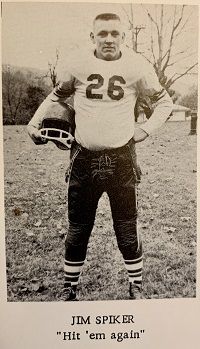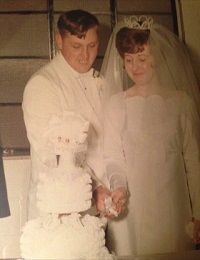| VFW Connections |
 |
Jim first joined the VFW in 1972 when he was recruited at the Occoquan location. However, after moving to Dale City in 1976, he transferred his membership to Post 1503. He also served as the Quartermaster of the post nine times and was heavily involved with many of the volunteer efforts at the post for decades. To say that our current post wouldn’t exist without Spiker’s help and hard work is an incredible understatement.
Jim’s History
Jim was born in Fairmont, West Virginia, and lived in Baxter, a small coal mining town. His family lived in a small four-room home. There were 10 children (five boys, three girls, and two boys who passed away) and Jim was the baby. All the boys in the family joined various branches of the military when they were of age. His father worked as a coal miner, but lived to be 97 years old. His mother was a house cleaner. He attended Rivesville High School and was a letterman in three sports: football, basketball, and baseball. There were no bus services, so he had to walk three miles to school or hitchhike—sometimes on the back of a motorcycle. However, everyone knew and trusted everyone in town and no one ever locked their doors. |
When he was 17 years old, Spiker was ready to join any branch of the military that could ship him out the quickest. The Marine Corps recruiter told him he could get him out in two weeks. His father had to sign the parental permission form to complete the enlistment and told his son that he didn’t have to go. However, Jim knew that the family could not afford to keep him at home, so it seemed like the best option for his future. Plus, Jim’s older brother and personal hero was a Gunnery Sergeant in the Marine Corps, so he signed up.
He completed boot camp at Parris Island South Carolina, spending his 18th birthday in training. As a present, his drill instructor only had him complete 20 pushups instead of the standard 40 for the day. After boot camp, he headed to Camp Geiger in North Carolina, the first section of what would later become Camp Lejeune. There, he was part of the 6th Marine Division. He served in the motor transport field and was responsible for the 81mm mortars. He calls himself a "true grunt.”
When he was 19 years old, he was transferred to work the fence line at Guantanamo Bay. In October of 1962, he found himself right in the middle of the Cuban Missile Crisis. At first, he thought the others were joking when he received a call asking if he had enough water and supplies. However, when the 50 calibers started arriving, he put on his helmet and grabbed his rifle. He was quickly relieved of fence duty as they fortified the area. From there, he spent 15 months at Cherry Point in North Carolina working for the commanding general.
After dreaming of going to the Marine Corps Air Station in Iwakuni, Japan, he extended for six months. However, his plans quickly changed midway into the flight when they landed at Hickam Air Force Base in Hawaii. This group was rerouted to Okinawa and then found themselves in South Vietnam for a year. After serving for six years, he received his honorable discharge at Quantico.
Once his enlistment was over, Spiker headed back to West Virginia. Finding no work there, he knew he would need to relocate eventually. However, he used the opportunity of being back in his hometown to rekindle a romance with his high school sweetheart, who had written to him while he was in Vietnam. He married Irene and they enjoyed 54 years of a beautiful partnership before she passed away in July of 2020. Spiker remembers when they first started out, they only had $100 and their two cars: a ’51 Ford and a ’64 Corvette.
 His first job after the Marine Corps was at Virginia Power. It was here he met many individuals who would later be instrumental in building our post. After two years of employment with Virginia Power, he began a 26-year career as a correctional officer. In 1968, he started worked at the old DC jail, nicknamed "the Dungeon.” After this, he worked with the Lorton Prison system and was promoted to Lieutenant. He took over at the women’s division in DC. He earned a reputation for being tough but fair, helping to "straighten out” several locations, including the new DC jail and a maximum-security facility in Lorton where fights and corruption had been common prior to his arrival. As he earned the respect of those around him and Spiker’s reports were used in many trials and courtrooms. He retired as Major Spiker, although many referred to him by his Tarzan-inspired nickname, Major Bwana.
His first job after the Marine Corps was at Virginia Power. It was here he met many individuals who would later be instrumental in building our post. After two years of employment with Virginia Power, he began a 26-year career as a correctional officer. In 1968, he started worked at the old DC jail, nicknamed "the Dungeon.” After this, he worked with the Lorton Prison system and was promoted to Lieutenant. He took over at the women’s division in DC. He earned a reputation for being tough but fair, helping to "straighten out” several locations, including the new DC jail and a maximum-security facility in Lorton where fights and corruption had been common prior to his arrival. As he earned the respect of those around him and Spiker’s reports were used in many trials and courtrooms. He retired as Major Spiker, although many referred to him by his Tarzan-inspired nickname, Major Bwana.
After signing up with the Occoquan VFW in 1972, he decided to transfer his membership to our post in 1976 after seeing a sign for the VFW when exploring his new neighborhood in Dale City. During those days, the VFW consisted of "two tables and a fridge” in a trailer. They moved to another small location called "The Hole in the Wall,” consisting of some tables and a small bar. The members would get together on Friday nights for a dinner. Jim and his friends were jokingly named the "Clique Corner Club” for always hanging out in the corner of the old location together. This group started golfing together and eventually started the Dickey Moore Memorial tournament, named after a 1st Sgt in the Army, which later grew into the VFW Golf Tournament at Quantico.
Bingo used to be held at the firehouse and Spiker remembers the days of setting up the entire hall before having to pack it all up again with John Dodge, John’s father, and a handful of volunteers. Spiker served as the Senior Vice for the Comrades. However, the group knew that the post would never be able to grow in membership if they didn’t secure a new facility, so they put everything they had into getting the new facility we enjoy today.
They moved in 1989 and Spiker became the first Commander. As the facility was being built, a team would come to the construction site and scrub the floors every night. When the facility was ready, they organized the membership to move everything to the new location in a single day. The early days of the facility were challenging, with many making significant financial sacrifices and donating their time to ensure the post survived. Spiker credits those early post members, especially John Dodge and his father, and community members for giving everything they had to keep it going. Individuals like Marty Travis from Virginia power provided a boom truck to help with the construction of the pavilion and to dig the holes needed for the parking lot lights. "Mac” Miller from Miller Funeral Home helped organize with a construction company to get a loader to put the car stops in the parking lot. Long-time volunteer Waldo has helped with electrical work, also building the light sign that highlights the bartenders’ names. Padrino’s would provide sandwiches when they used to sell Christmas trees in the Dairy Queen parking lot. The success of Post 1503 would not have happened without all their hard work.
In addition to the generous financial donations from many of the early post members, the group also received approval to be a charitable gambling site, which provided a steady stream of income. The weekly bingo games also grew, which helped to support the post. Bit by bit, the mortgage for the post facility was finally paid off and everyone celebrated with a "mortgage burning party” for all their hard work.
Spiker served nine years as the Post 1503 Quartermaster. Due to the incredible growth in membership and the facilities, Jim was the co-captain of the National All-American Team, the captain of the All-State Team, and was named the Post Quartermaster of the Year nine times over. However, Spiker feels very strongly about volunteerism, valuing it without the expectation of any sort of reward or recognition.
Spiker is very proud of everything he’s been able to accomplish with his life. Coming from Baxter, West Virginia to building a life for himself, he realizes how far he’s come. As a boy, he couldn’t afford any of the luxuries we might take for granted today, like 10 cents to attend a sports game or being able to buy pizza. Now, he’s happy to be mortgage-free on his home and have a Lincoln Town Car that he loves. He reminds all of us that life is precious. "You’ve gotta fight to keep yourself alive. Nobody’s going to do it for you.” He took this fighting spirit into his own rehabilitation process after a series of serious illnesses. He learned to walk again and continues to push himself to be more mobile today. He also has quite a memory, being able to recall the many names and dates of the adventures from his life. Although their home was the last one built in his neighborhood, he is the only one from the original development who still lives there today.
- Jim’s favorite subject in school was American history.
- Spiker did get to make that trip to Iwakuni before he left the military. During his last three months, he told his CO about the six-month extension to his enlistment and he was given 10 days to tour around.
- Although he was originally interested in taking on a law enforcement career after the military, he felt it was a better long-term financial decision to work as a correctional officer.
- Even though he loves music, you won’t see Spiker at karaoke night. One day he was singing along with the radio and his mom asked how she could turn him off!
- Breaking ground and building the post was not easy. Jim recalls going through five lawnmowers the first time they tried to cut the grass, due to the large, hidden rocks on the land. They also wanted to get trees to plant for a wind break. After organizing eight trucks to pick up the new trees, the group laughed when they were presented with tiny saplings in small pots. However, some of these trees are still alive and surrounding the post today!
- Spiker was awarded with an impressive 32 VFW-affiliated hats over his many decades of serving and volunteering.
- While he was in rehab, Jim received the affectionate nickname "Buttercup” from two doting nurses who worked with him to walk again.
- Jim is a cat lover. He recently adopted a cat named Allie. He also has a group of outside cats he calls "the clowns.”
